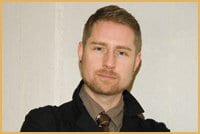Health programming for gay men in Vancouver is evolving.
“It’s moving from looking at HIV/AIDS prevention and education work as an isolated piece,” says David Swan, executive director of AIDS Vancouver, “to a place where it’s completely embedded within the full range of gay men’s lives and health.”
The Health Initiative for Men (HIM) is undertaking the task of bringing this kind of service to Vancouver. Although officially formed in December 2007, a period of what HIM board chair Carl Bognar calls “extensive negotiations” with AIDS Vancouver and Vancouver Coastal Health has meant that the group is only now in the beginning stages of working directly with the public.
“We’re ready for volunteers for some specific activities,” Bognar says.
Phillip Banks, HIM’s executive director, confirms that the group will soon be putting out a call for volunteers with particular skills.
One project that will tap the creative talents of queer locals is the web-based animated series Vick Vancouver. Banks calls the series “the most tangible transplant” from HIM’s precursor Gayway.
Banks says his experiences at Gayway helped drive the creation of HIM. “What we saw was a lot of men coming out that wanted to do something. They didn’t just want to come and get a service,” he says, “they wanted to contribute.”
Through negotiations with Vancouver Coastal Health and AIDS Vancouver, the service contract for Gayway was transferred to HIM earlier this year. “In this 25th anniversary year, AIDS Vancouver has given a gift back to the gay community,” says Banks. “That’s how I think of it.”
“It’s a sort of natural growth out of the work that AIDS Vancouver has done in 25 years in HIV prevention for gay men,” says Swan. By working with HIM in a way similar to their collaboration with other population-specific groups, like ASIA or the Positive Women’s Network, Swan says AIDS Vancouver is in no way abandoning the gay community.
“Our case management program and our grocery program and our support program [are] providing services to gay men all the time and will continue,” he says. Swan also points to a new education worker position that is being created which he says will in part act as a bridge between the two organizations.
“We really think of health as a resource that people have in their lives that supports them to achieve their fullest potential,” says Banks.
The brainchild of several gay men’s health advocates, among whose experiences include working with ManCount, Sex Now, Insite, and AIDS Vancouver, HIM aims to be what Banks says is, most simply, “a health and wellbeing promotional organization.”
Inspired by the successes in women’s and aboriginal health movements, Banks says it’s time for queer men to become more involved in their own health —”to think of health as way beyond disease,” he says. It’s “about creating opportunities for people to connect and to feel validated. New and more contemporary understandings of health encompass that.”
Longtime AIDS activist John Kozachenko agrees that the gay community needs to face up to a wider range of health concerns. “I think the focus has been —although very important that it has been —on HIV/AIDS,” he says. “People aren’t really aware of other health issues that they might be concerned with.”
“To effect the kind of change that will have a long-term impact on reducing risk and vulnerability,” says Banks, “you have to address the social issues.”
“There are issues related to childhood experiences of sexual abuse, issues around social support, around homophobia, power imbalances in relationships, alcohol and substance use,” Bognar explains. “All of those things sort of form a big knot of problems that can’t be attacked individually.”
“The big, big, big bad guy in all of this is homophobia, heterosexism —the bullshit that makes queers, transfolks feel like their sexual or gender identities are somehow defects,” Banks adds.
“For gay men especially,” notes Kozachenko, “our history has been of socializing in the bar scenes.” Banks says HIM will aim to encourage different kinds of connections between queer men in the community.
“A really important and fundamental aspect of health promotion is to get guys to take action and to involve themselves in something,” he says.
HIM’s programming will be determined through both a review of scientific literature surrounding the health needs of gay men and community consultations. Although the agency still has some work to do before it’s ready to officially go public, both Bognar and Banks hope the launch will coincide closely with the Gay Men’s Health Summit at the end of October.
In the meantime HIM will be developing a new website to include podcasts, blogs and other “pull technology” that will encourage visitors to participate, says Bognar.
“Vancouver’s a healthy city,” reminds Banks, “but it can be healthier by increasing a sense of openness and increasing people’s sense of connection to their community and feeling like they’re not invisible. And that’s an important outcome for us.”

 Why you can trust Xtra
Why you can trust Xtra


